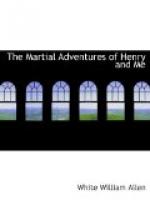“Any one hurt, Singer?” asked a handsome youth named Hughes, of the Corps.
“Man hit by the first shell up here by the railroad. I’m going after him.”
“Hurt badly?” asked another boy.
“Oh, arm or shoulder or something blown off. I’ll be back for lunch.”
The details interested us; we could see that the secret was being uncovered. Again came an awful roar and another terrific bang—this time the dust cloud rose nearer to us than before—perhaps 300 feet away. Every one ducked. In five seconds they had taught me to duck. It’s curious how quickly the adult mind acquires useful information. But Henry for some reason got a bad start, and his duck needed correction. To duck, you scrooch down, and shrink in, to get as much as possible of your body under the eaves of your steel helmet. Somewhere between the second and third bang, they got a helmet on me. No one knows where it came from, nor how it got there. But there it was, while they were correcting Henry’s duck. In spite of them, when he ducked, Henry would lean forward, thus multiplying his exposure by ten. But it really does a fat man little good to duck anyway; the eaves of his helmet hardly cover his collar. It was while they were trying to telescope Henry that some one grabbed me by the arm and said: “Come on! Let’s go to the abri!” Abri was a brand new word to me, but it seemed to be some place to go and that was enough for me.
“Where” (read this line with feeling and emphasis) “is the abri?” The ambulance boy took me by the arm and led me on a trot to a dugout covered with railroad iron, and logs and sand bags, and we went in there and found it full of French officers. They have some sense. The abri would not turn a direct explosion of a shell; but it would shield one against a glancing blow and against the shrapnel which sprays itself out from the point where the shell hits like a molten iron fountain. After the ninth bomb had come over we left the abri. The Germans had been allowancing Recicourt to nine a day. But that day they gave us three more prunes for dessert. They came very close and fairly fast together. As they came Henry was sitting in the barn where the ambulance boys had their meals. Lunch was on the table and Henry was writing. The shells sounded just outside the barn. “What are you writing, Mr. Allen?” asked Major Murphy. “I’m sketching,” stuttered the Wichita statesman, “a sort of a draft of the American terms of peace!”




